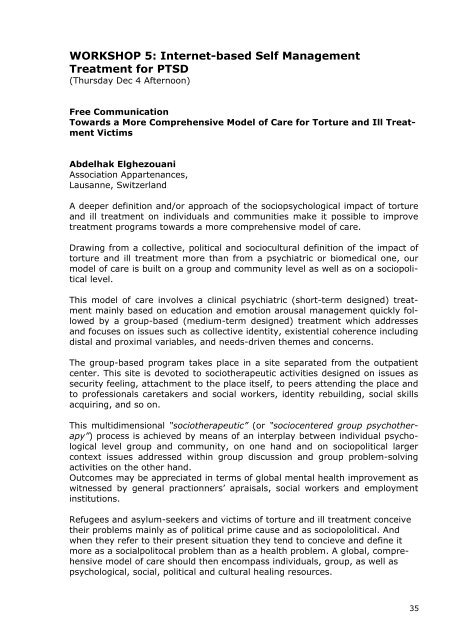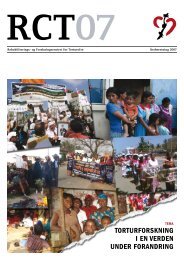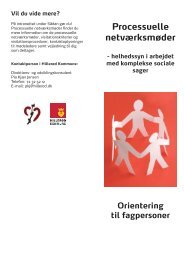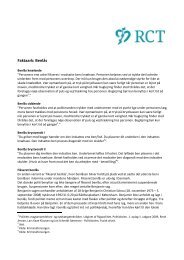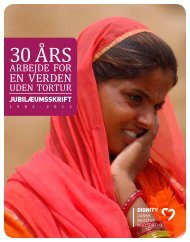Rehabilitating Torture Survivors - Dignity - Danish Institute Against ...
Rehabilitating Torture Survivors - Dignity - Danish Institute Against ...
Rehabilitating Torture Survivors - Dignity - Danish Institute Against ...
You also want an ePaper? Increase the reach of your titles
YUMPU automatically turns print PDFs into web optimized ePapers that Google loves.
WORKSHOP 5: Internet-based Self ManagementTreatment for PTSD(Thursday Dec 4 Afternoon)Free CommunicationTowards a More Comprehensive Model of Care for <strong>Torture</strong> and Ill TreatmentVictimsAbdelhak ElghezouaniAssociation Appartenances,Lausanne, SwitzerlandA deeper definition and/or approach of the sociopsychological impact of tortureand ill treatment on individuals and communities make it possible to improvetreatment programs towards a more comprehensive model of care.Drawing from a collective, political and sociocultural definition of the impact oftorture and ill treatment more than from a psychiatric or biomedical one, ourmodel of care is built on a group and community level as well as on a sociopoliticallevel.This model of care involves a clinical psychiatric (short-term designed) treatmentmainly based on education and emotion arousal management quickly followedby a group-based (medium-term designed) treatment which addressesand focuses on issues such as collective identity, existential coherence includingdistal and proximal variables, and needs-driven themes and concerns.The group-based program takes place in a site separated from the outpatientcenter. This site is devoted to sociotherapeutic activities designed on issues assecurity feeling, attachment to the place itself, to peers attending the place andto professionals caretakers and social workers, identity rebuilding, social skillsacquiring, and so on.This multidimensional “sociotherapeutic” (or “sociocentered group psychotherapy”)process is achieved by means of an interplay between individual psychologicallevel group and community, on one hand and on sociopolitical largercontext issues addressed within group discussion and group problem-solvingactivities on the other hand.Outcomes may be appreciated in terms of global mental health improvement aswitnessed by general practionners’ apraisals, social workers and employmentinstitutions.Refugees and asylum-seekers and victims of torture and ill treatment conceivetheir problems mainly as of political prime cause and as sociopololitical. Andwhen they refer to their present situation they tend to concieve and define itmore as a socialpolitocal problem than as a health problem. A global, comprehensivemodel of care should then encompass individuals, group, as well aspsychological, social, political and cultural healing resources.35


